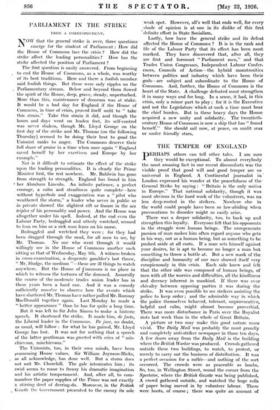PARLIAMENT IN THE STRIKE
FROM A CORRESPONDENT.
NOW that the general strike is over, three questions emerge for the student of Parliament : How did the House of Commons face the crisis ? How did the strike affect the leading personalities ? How has the strike affected the position of Parliament ?
The first question is easily answered. From beginning to end the House of Commons. as a whole, was worthy of its best traditions. Here and there a foolish member said foolish things. But these were only ripples on the Parliamentary stream. Below and beyond them flowed the spirit of the House, deep, grave, steady, unperturbed. More than this, maintenance of decorum was at stake. It would be a bad day for England if the House of Commons, in time of crisis, proved itself unfit to " take this strain." Take this strain it did, and though the hours and days went on leaden feet, its self-control was never shaken, though Mr. Lloyd George on the first day of the strike and Mr. Thomas (on the following Thursday) seemed to be doing their best to goad the Unionist ranks to anger. The Commons deserve their full share of praise in a time when once again " England saved herself by her exertions and Europe by her example."
Nor is it difficult to estimate the effect of the strike upon the leading personalities. It is clearly the Prime Minister first, the rest nowhere. Mr. Baldwin has gone from strength to strength. England has found in him I her Abraham Lincoln. An infinite patience, a perfect courage, a calm and steadiness quite complete—here without hyperbole and exaggeration was a " pilot who weathered the storm," a leader who never in public or in private showed the slightest rift or fissure in the aes triplex of his personality and power. And the House was altogether under his spell. Indeed, at the end even the Labour Party, bedraggled and utterly wretched, seemed to lean on him as a sick man leans on his nurse.
Bedraggled and wretched they were ; for they had been dragged through the mud, for all men to see, by Mr. Thomas. No one who went through it would willingly see in the House of Commons another such sitting as that of Wednesday, May 5th. A witness broken in cross-examination, a desperate gambler's last throw, " Mr. Sludge, the medium "—these are ill things to watch anywhere. But the House of !Commons is no place in which to witness the tortures of the damned. Assuredly the course of the moderate trades union leader has in these years been a hard one. And it was a comedy sufficiently macabre to observe how the events which have shattered Mr. Thomas have rather pulled Mr. Ramsay MacDonald together again. Last Monday he made a " better appearance " than he has for quite a long time.
But it was left to Sir John Simon to make a historic speech. It shortened the strike. It made him, de facto, the Liberal leader in the Commons. De jure, no doubt, as usual, will follow : for what he has gained, Mr. Lloyd George has lost. It was not for nothing that a speech of the latter gentleman was greeted with cries of " mis- chievous, mischievous."
The Unionists, too, in their own minds, have been reassessing House values. Sir William Joynson-Hicks, as all acknowledge, has done well. But a storm does not suit Mr. Churchill. The gale intoxicates him ; its swirl seems to rouse to frenzy his dramatic imagination and his artistic temperament. And, after all, to com- mandeer the paper supplies of the Times was not exactly a stirring deed of derring-do. Moreover, in the British Gazette the Government presented to the enemy its sole weak spot. However, all's well that ends well, for every shade of opinion is at one in its dislike of this first definite effort in State Socialism.
Lastly, how have the general strike and its defeat affected the House of Commons ? It is in the rank and file of the Labour Party that its effect has been most marked. They have discovered that, after all, they are first and foremost " Parliament men," and that Trades Union Congresses, Independent Labour Confer- ences, Councils of Action—the hybrid monstrosities between politics and industry which have been their gods—are subject and subordinate to the House of Commons. And, further, the House of Commons is the heart of the State. A challenge defeated must strengthen it in many ways and for long. In a sense, it had, in this crisis, only a minor part to play ; for it is the Executive and not the Legislature which at such a time must bear the chief burden. But in these heavy days the House acquired a new unity and solidarity. The twentieth- century House of Commons is now a ship that has " found herself." She should sail now, at peace, on sunlit seas or under friendly stars.














































 Previous page
Previous page